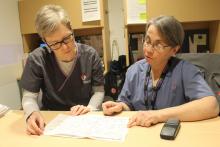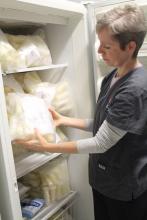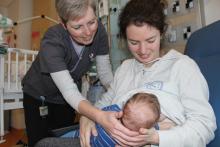A day in the life of . . . two lactation consultants

Lactation consultants (and nurse clinicians) Mireille Béchard and Cathy Deacon spend a lot of time getting to know each mom in the Neonatal Intensive Care Unit (NICU) at the Montreal Children’s Hospital (MCH). Over the last 16 years, their team at the Children’s has grown from one to five, including nurse clinicians Amanda Camacho, Karine Huppé, and Magdalena Arciszewska, who are all currently preparing for certification as lactation consultants.
Initiating and encouraging breastfeeding
The team not only covers the NICU, but also supports mothers throughout the MCH, including the Pediatric Intensive Care Unit (PICU), inpatient units, emergency department, and clinic areas. “Our main role is to promote and preserve lactation,” says Cathy. “And then we help mom and baby come together while breastfeeding. Skin to skin contact with baby plays a big part in helping moms produce milk; it also helps both of them get ready for breastfeeding.”
Breastfeeding can be difficult for a lot of mothers, especially for those who give birth to premature babies. Some babies, including premature or sick ones, are not yet able to suck effectively. The team teaches mothers how to initiate, support and preserve their milk supply, usually through the use of a breast pump, until their child is ready to breastfeed.
Every room in the NICU has its own breast pump so that mothers can pump alongside their babies, but they also have to pump at home around the clock to ensure optimal production. Some babies are eligible for pasteurized donor breastmilk from Héma-Québec’s milk bank, while their moms try establishing their own production. This process can be especially grueling for a mother of twins, who needs to double their production. “Last year, we had 60 sets of twins in the NICU,” says Mireille.
Helping mothers outside the NICU
Their colleague Magdalena is primarily based at the Royal Victoria Hospital (RVH), but the rest of the team can be called upon to offer support to mothers or newborn patients in the RVH’s birthing centre, postpartum unit or adult ICU. “We support mothers in all different types of situations,” says Cathy. “And at times, we even help moms to better balance or stop their breastmilk production when needed.”
The team is also called to the MCH emergency department to consult mothers who arrive with breastfeeding babies who are ill. “In these circumstances, we need to assess how the baby is breastfeeding and how this relates to their illness. We may need to help these moms produce more milk and/or help baby to become more efficient at the breast. It’s important to know that just because a baby is at the breast doesn’t mean they’re actually eating,” says Mireille.
However, if a child is born with a number of complications, they might take longer to learn to breastfeed or they might never completely develop that ability. “In these instances, the child can receive breastmilk through a variety of means,” says Cathy. “We meet mothers wherever they’re at and help them reach their goals by providing support and information as well as liaise with other heath professionals regarding the feeding of these babies.”
Working with moms seven days a week
There are over 1,700 lactation consultants in Canada, and 30,000 worldwide, and the field is continuing to grow. Consultants are officially certified and internationally recognized by the International Board of Lactation Consultant Examiners and the certification needs to be renewed every five years by exam and continuing education.
“Mothers are encouraged to breastfeed exclusively until their child is six months old, so if a baby is hospitalized for a long period of time, there’s a good chance we see their mom over 40 times during their stay. We end up developing very special bonds,” says Mireille.





